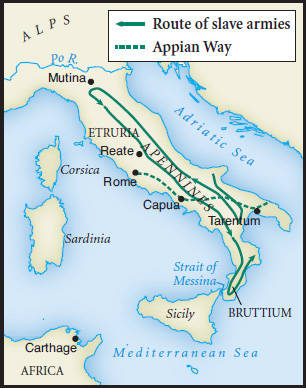Resistance and Rebellion

Roman slaves, like their counterparts in other societies, responded to enslavement in many ways. Most, no doubt, did what was necessary to survive, but there are recorded cases of Roman prisoners of war who chose to commit mass suicide rather than face the horrors of slavery. Others, once enslaved, resorted to the “weapons of the weak”—small-scale theft, sabotage, pretending illness, working poorly, and placing curses on their masters. Fleeing to the anonymous crowds of the city or to remote rural areas prompted owners to post notices in public places, asking for information about their runaways. Catching runaway slaves became an organized private business. Occasional murders of slave owners made masters conscious of the dangers they faced. “Every slave we own is an enemy we harbor” ran one Roman saying.14
On several notable occasions, the slaves themselves rose in rebellion. The most famous uprising occurred in 73 B.C.E. when a slave gladiator named Spartacus led seventy other slaves from a school for gladiators in a desperate bid for freedom. The surprising initial success of their revolt attracted a growing following of rebellious slaves, numbering perhaps 120,000 men, women, and children at the height of the uprising. For two years, they set Italy ablaze. In a dramatic reversal of roles, they crucified some captured slave owners and set others to fighting one another in the style of gladiators. Following a series of remarkable military victories, the movement split and eventually succumbed to the vastly superior numbers of the Roman legions. A terrible vengeance followed as some 6,000 rebel slaves were nailed to crosses along the Appian Way from Rome to Capua, where the revolt had begun.
Nothing on the scale of the Spartacus rebellion occurred again in the Western world of slavery until the Haitian Revolution of the 1790s. But Haitian rebels sought the creation of a new society free of slavery altogether. None of the Roman slave rebellions, including that of Spartacus, had any such overall plan or goal. They simply wanted to escape Roman slavery themselves. Although rebellions created a perpetual fear in the minds of slave owners, slavery itself was hardly affected.